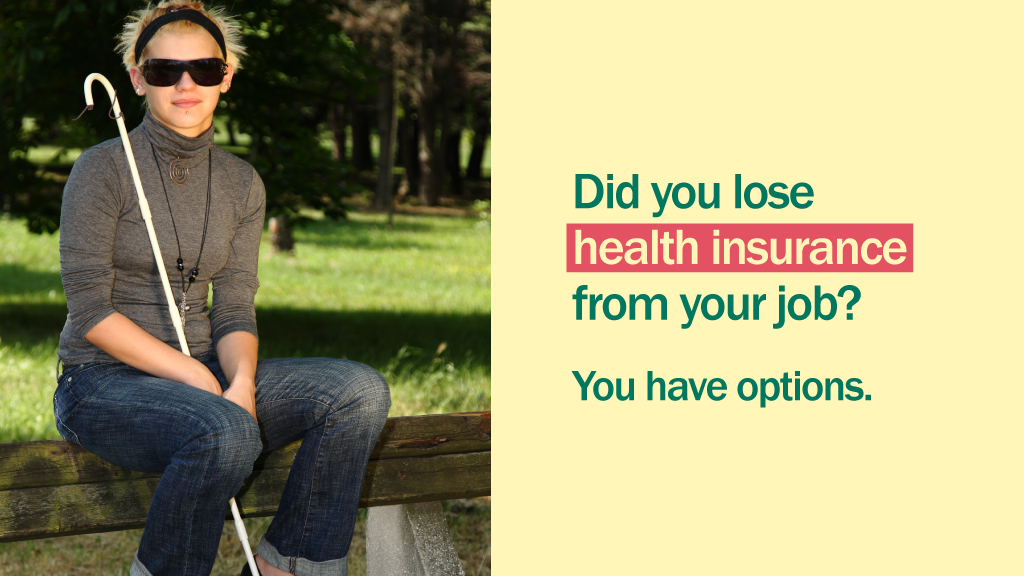COVID-19 & SEPs
With the outbreak of the coronavirus (COVID-19), many people may have lost their health insurance coverage due to a loss of employment, or people who do not have insurance may be wondering if they can now enroll in a plan. There are Special Enrollment Periods (SEPs) for which many of these people may be eligible. For instance, did you know that if you lost your coverage due to a loss of employment you are eligible for a SEP for 60 days?
AAHD has been working with Community Catalyst and other partners in conducting outreach to educate individuals about health insurance literacy, special enrollment periods (SEPs) and other issues related to healthcare enrollment. Links to graphics like the one below which highlight the SEP for a loss of job can be found in the Community Catalyst Outreach Hub which has a wide variety of graphics on SEPs. To learn more about the project we are doing with Community Catalyst, check out our earlier news item.
Currently, individuals in states on the federally facilitated marketplace that use healthcare.gov are ineligible for a Special Enrollment Period (SEP) because, as of the writing of this newsletter, the federal government has not authorized a SEP due to the coronavirus outbreak. However, some states which run their own state-based marketplace (SBM) have elected to offer a SEP during this time to allow for enrollment. For a full list of what the SBMs are doing, check out our news item as we’ve updated it since last week.
Last week, we highlighted an issue brief from the Kaiser Family Foundation which addressed what states could do with their Medicaid programs to help in the response for COVID-19. Many states have applied for Medicaid waivers to address the COVID-19 crisis. Kaiser has an interactive page which shows what states are doing with 1135 and 1915(c) waivers.
In addition, the Kaiser Family Foundation has a webpage dedicated to what different states are doing as it relates to health insurance coverage for COVID-19. This helpful page includes interactive maps with the number of cases and deaths in each state and what states are doing related to waiving cost-sharing for testing and/or treatment, waiver of preauthorization requirements and allowance for early prescription refills.
This month represents the 10-year anniversary of the Affordable Care Act (ACA) becoming law and this past Monday was the official 10-year anniversary of the passage of the ACA. Leading up to the anniversary date, we published a series of 10 blog posts which highlight the importance of the ACA for people with disabilities. Links for these blog posts are as follows:
- Friday, 3/13: Prohibition against Denial of Coverage for Pre-Existing Conditions
- Saturday, 3/14: Guaranteed Renewability of Coverage
- Sunday, 3/15: Prohibition against Individual Underwriting
- Monday, 3/16: Essential Health Benefits Required in Every Qualified Health Plan
- Tuesday, 3/17: Prohibition against Lifetime Monetary Caps
- Wednesday, 3/18: Prohibition against Discrimination in Health Programs
- Thursday, 3/19: Extension of Mental Health Parity to the Individual and Small Group Market
- Friday, 3/20: Medicaid Expansion
- Saturday, 3/21: Highlighting Other Protections/Benefits
- Sunday, 3/22: Advocacy – The Future of the ACA
Also on the ACA anniversary and COVID-19, check out this week’s blog post from the Georgetown University Center on Health Insurance Reforms which highlights the benefits the ACA provides during times of public health emergencies like COVID-19.
Are you looking for local partners to help with outreach to the disability community? The NDNRC has Community Outreach Collaboratives (COCs) which work to increase collaborations in the community, dissemination and outreach efforts and enrollment of people with disabilities in the ACA marketplace. You can find a COC, on the COC page of our website.
Archives of our weekly updates are available on the NDNRC website.

